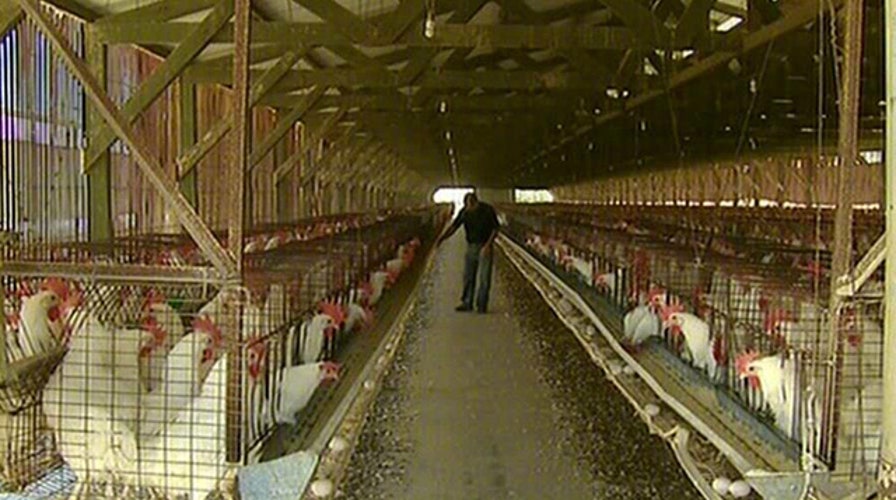Law regulating eggs in California could have ripple effect
William La Jeunesse reports from Los Angeles
Should California tell farmers throughout the country how to run their farms? Rep. Steve King, R-Iowa, says no.
"It's exactly what our founding fathers wanted to avoid," King said.
But the rural-state lawmaker is concerned over California's strict laws on egg producers and other farmers as a result of Proposition 2, a ballot initiative passed by voters in 2008. The law requires egg producers to increase their cage size to more than 200 square inches, more than triple the industry recommendation. As a result, farmers from other states must comply with California hen cage standards if they wish to sell their product in the Golden State.
If they don't comply, they can't do business there.
But not if King has his way. He's proposed an amendment to the pending farm bill in Congress which would allow farmers in other states to sell eggs in California without having to comply with the state's law.
"After a while, you end up with a patchwork quilt of 50 states with different regulations and it's impossible to comply with them," King said. If his measure doesn't pass, he worries that more states could try to dictate farm policy to the rest of the country.
It's a fight that has made for some strange bedfellows. The United Egg Producers is joining forces with the U.S. Humane Society to fight King's amendment, marking a rare occasion when farmers are partnering with a prominent animal rights group. But California ranchers say King's amendment is a competition-killer which will put them out of business by allowing farmers in states like Iowa and Indiana to produce eggs at a much lower cost.
"There's no reason for anybody to produce an egg in this state when it can be produced in another state for half the cost," said Eddie Voortman, a third-generation egg rancher in Ontario, Calif.
At Voortman's Egg Ranch, they're gearing up to change their chicken cages to comply with California law, which takes effect in 2015. That will take money. And it will leave them with fewer hens.
"We're gonna have to open up the cages quite a bit, give them a lot more room to spread around," Voortman said, overlooking his farm's 50,000 hens. "That's kinda where we're at a disadvantage right now. Other states aren't gonna have to comply with that."
King said he feels for California farmers who say they will suffer from his amendment, but believes the solution is to change the law in California.
"It was a mistake for California to do what it did," King said. "I'm sorry that that's the case. But we can't impose that mistake on the rest of America."
While the Humane Society is typically no friend of farmers, now they are working hand in hand with the egg lobby to pass a different bill, one which would standardize the size of hen cages nationwide. It's a concession for egg producers who believe a national standard could pre-empt one state from telling another how to raise its farm animals.
But for farmers like Eddie Voortman, it could save a business that's been in the family since 1951.
"We've both compromised. It's not our ideal system," conceded Wayne Pacelle, CEO of the U.S. Humane Society, who prefers cage-free laws. "But it's a measurable advance that will not just apply to California, but to Iowa, Indiana, Missouri -- the rest of the nation."





